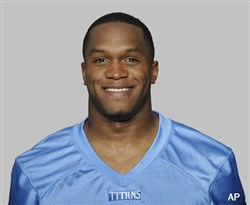VOL. 37 | NO. 7 | Friday, February 15, 2013
A Life Line for the NFL's most vulnerable
By Linda Bryant
Ten active-roster or former NFL players have taken their lives in the past seven years, including Tennessee Titans wide receiver OJ Murdock, who committed suicide in July 2012 after being sidelined for the season because of injuries.
Murdock texted or called confidantes, family and coaches in the days leading up to the tragedy with polite, slightly cryptic messages that, in retrospect, sound a lot like goodbye letters.
But no one recognized the 25-year-old’s words as red flags for suicide.
Now, Nashville’s Centerstone is on the front line of efforts to prevent tragedies like Murdock’s from happening in the future.
The organization, which specializes in mental health and addictions treatment, was chosen from 161 crisis centers nationwide to operate the NFL Life Line, a crisis service for current and former NFL players, coaches, team and league staff, and their family members. Only one other mental health provider, the Mental Health Organization of New York City, was chosen to run the 24/7 hotline.
Former NFL QB speaks out
Eric Hipple, a retired NFL quarterback who spent nine years with the Detroit Lions in the 1980s, says a crisis line would have helped him had one been available during the years when he was struggling with depression, addiction and suicidal thoughts.

OJ Murdock
“This is an important step for the NFL,” Hipple says. “Most guys (in the NFL) don’t even know what depression is. You couldn’t even say the word 10 years ago. It’s very similar to the way we used to think of cancer, but people accept the disease and aren’t as afraid to talk about it as they used to be. We need to get to that point when it comes to understanding mental illness.”
Hipple, 55, is one of a handful of NFL players who have gone public with their mental health struggles. He sought help for problems related to depression and self-destructive behaviors after his 15-year-old son committed suicide in 2000. He now speaks about mental health and suicide prevention on a daily basis as an outreach specialist for the University of Michigan Depression Center.
“NFL players and those connected to them have the same problems as others in our society, but they also have a unique culture.” says Becky Stoll, Centerstone’s vice president for crisis disaster management. “It’s (working in the NFL) is a very high stress job, and there’s been a tough guy mentality that expects you not to show if it you’re hurting. You’re supposed to suck it up and keep going.”
The NFL Life Line is confidential and staffed by highly-trained clinical mental health professionals with masters degrees, all of whom are prepared to help with a wide array of emotional crises – addictions, life transitions, mood swings and depression, marital and family problems, financial stress, legal problems grief, suicidal thoughts and issues related to self-esteem.
Stoll says the line has had “steady participation” from players and others connected to the NFL since it was launched in mid-2012.
Going beyond crisis counseling
Many mental health experts are thrilled about the new service, but some say there’s also a critical need for more education and intervention for members of the NFL family.

Eric Hipple
“I’d like to see the NFL take even more steps to ensure a healthy team climate,” says Mark Anshel, a professor of health and human performance at Middle Tennessee State University. “The players are under much more pressure to perform than you or I, and will often play through pain and concussions. They don’t want to sacrifice their starting status and don’t want to let their team down. I think they need to be cared for more concretely and carefully.”
Anshel, who formerly worked with a professional rugby team in Australia as a mental health skills coach, says NFL players are at high risk for crisis because many base their self-esteem solely on their sports successes.
“There are serious consequences to being overly dependent on sport as a primary means of identity,” Anshel says. “We are still paying too high of a price for not intervening sooner and not identifying the high risk players.”
Tom Starling, president and CEO of the non-profit advocacy group Mental Health America of Middle Tennessee, agrees mental health awareness needs to permeate at deeper levels of the NFL and that Centerstone’s participation in the new initiative is a good first step.
About Centerstone’s crisis services and how to get help
Centerstone is a large non-profit mental health provider in Middle Tennessee that serves nearly 50,000 children, adolescents, adults and seniors yearly.
In addition to the NFL Life Line, Centerstone operates Triage Line, a 24-hour, 7-day crisis line for anyone who feels a need to reach out because of a mental health-related crisis or issue. Calls are completely confidential. Callers are given information and access to services or programs needed to help. The number for Middle Tennessee is 615-460-HELP (4357). For the state of Tennessee the number is 888-291-HELP (4357). A confidential chat line is also available at crisischat.org
“Mental illness is still that hidden door in the dark corner,” Starling says. “Anything we can do to help athletes overcome the stigma of mental illness and the idea that reaching out for help is somehow a weakness is a step in the right direction. I really think Centerstone is the best resource in the nation for this.”
Anshel says the league should have mandated mental health screenings.
“I’d like to see the NFL Players Association mandate at least one hour of mental health skills training, coaching and education at the beginning of the season,” Anshel says. “Every single athlete who misses a game should receive mandated counseling.
“Mental health awareness needs to be a part of a team’s entire culture from top to bottom. Coaches should also reach out and inform and remind players about the risks, warning signs and about how to manage the stress.”
Concussions and mental health
The NFL’s new mental health crisis line also comes at a time when the league is facing what some have called a “concussion crisis.” More than 2,000 former players filed a massive class action suit in 2012 claiming the NFL concealed information about the link between long-term brain injuries and concussions.
The mental health issue relates to the concussion because numerous medical experts have noted that brain trauma often includes symptoms of mental imbalance such as cognitive disorientation, irritability, depression, fatigue and difficulty concentrating.
In a Feb. 4 interview on “Face the Nation,” NFL Commissioner Roger Goodell refused to answer a question about the link between football and brain injuries but said the NFL is committed to researching the issue.
MTSU’s Anshel calls the concussion issue “the hidden devil of sports competition.”
“I really don’t have any doubt that multiple concussions can exacerbate mental health issues,” he says.
Pam Bryan, executive director of the Brain Injury Association of Tennessee, says she agrees with Anshel. She says her non-profit organization would love to help teach professional sports teams about the issue.
“I don’t think players realize how a brain injury can affect them now and in the future,” Bryan says. “Trauma to the brain results in many mood and behavior problems. Brain injuries themselves may cause changes in brain structure and function that predispose people to depression.
“But certain factors also seem to increase a person’s risk, including a history of alcohol abuse or depression before the injury,” Bryan adds. “ I have talked to many brain injury survivors, regardless of how they received their brain injury, who are living with depression as a result of the injury.”
Hipple warns against using the concussion issue as a panacea for mental health problems among players. He says it is sometimes easier for players to see concussions as the culprit of all their problems, rather than consider that they may have a full-blown mental health condition such as bipolar disorder or clinical depression.
“A lot of guys are coming forward now because they are finding relatable associations (between chronic traumatic encephalopathy (CTE), the chronic brain disease associated with repeated concussions) and some of their symptoms,” Hipple says. “But just because you can identify the symptoms, doesn’t mean you’ve identified the cause. I do not see the problem overall as a CTE problem; I see it as a mental health problem.”
Hipple is most concerned about players learning how to cope with symptoms of mental illness. He wants them to see that they can have mental illness and still learn to live a mentally healthy life. The fact is you can have a brain illness and still be mentally fit.”
“I think it’s probably a mistake just to focus on head injuries,” Hipple says. “We have to work on better outcomes for the players, whether the issue is CTE or mental illness. Education is what can make the difference.
“Working on key aspects of mental health such as how to deal with negative thoughts and learn better problem solving. We need to teach stress reduction, resilience and positive psychology.
“The crisis line is going to save lives, but we also need earlier intervention,” Hipple adds. “Right now we are operating on the surface of the problem, and we need to go deeper.”
Hipple says the game will eventually evolve into a safer and healthier game for all involved.
“I believe without a doubt, we’ll find the right balance,” he says. “Right now the NFL has a huge opportunity to make the right statement and to push the issue out in front and really talk about it.”